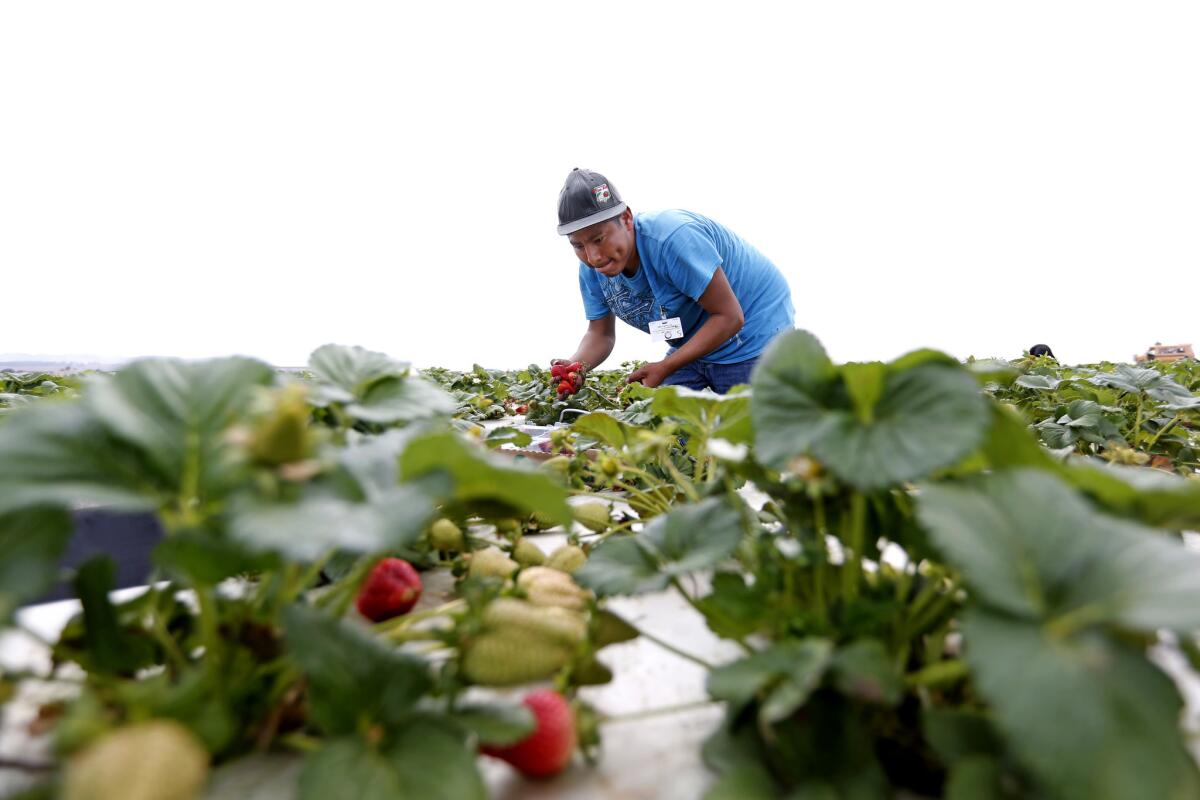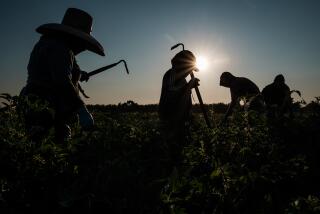Elizabeth Warren unveils farmworkers’ rights plan

- Share via
Sen. Elizabeth Warren unveiled a plan for farmworker and food chain employee rights Monday that would bolster federal safety protections and workers’ access to basic rights.
The Massachusetts senator’s proposal comes the day before Super Tuesday, when voters cast ballots in 14 states including California, home to about a third of the nation’s farmworkers, many of whom are in the country illegally. Warren also plans to appear Monday in East Los Angeles, where she is expected to speak about the Justice for Janitors movement.
“For decades, agricultural labor has been intentionally excluded from basic labor laws. ... This exclusion was justified with explicitly racist reasons, one of the many ways in which Americans of color were excluded from the opportunities that built America’s white middle class,” Warren notes in her plan.
She commits to including farmworkers in the fight for a $15 minimum wage and supports replacing the H2-A agricultural guest worker visa program, under which labor contractors and farms have been accused of housing law violations and wage theft, with an immigrant worker visa.
“A life as a farmworker should not be a poverty sentence, but instead a path to the middle class and a source of opportunity for their families,” Warren says in her plan.
Here are 2020 Democratic presidential candidates Joe Biden and Bernie Sanders’ plans on healthcare, immigration, climate, gun control and housing and homelessness.
Warren plans to push for heat and air quality safety standards, noting only California and Washington require that farmworkers be given access to water and shade. She would ban a nerve agent pesticide linked to developmental disorders that was saved from elimination by the Trump administration. The primary maker of that chemical has said it would halt production after a ban in California.
A federal crackdown on immigrants in the country illegally has worsened a labor shortage in states including California, and as a result, the state is recruiting a record number of seasonal foreign workers from Mexico under the H2-A visa program. The U.S. Department of Labor has recently charged millions in fines against contractors and growers over violations in wage laws, including those that cover agricultural guest workers.
The plight of farmworkers often escapes the national political conversation, and Warren’s plan highlights major gaps in labor laws that leave them unshielded from abuse, said author Miriam Pawel, who has written extensively about the farmworkers movement and agricultural labor in California.
“It ties together not only immigration, not only labor organizing rights, not only health and safety but all of that together in a way that recognizes the injustices of decades and tries to, in a comprehensive way, rectify them,” Pawel said.

Warren has struggled in early primary states, placing no higher than third place after four contests, and her plan comes before primaries in California and Texas, whose Latino voters could help sway the races. A recent California poll showed Vermont Sen. Bernie Sanders with a 2-to-1 lead over Warren, but the race in Texas is more fluid.
Other Democratic candidates, including Sanders and former Vice President Joe Biden, propose expanding federal protections for farmworkers. Minnesota Sen. Amy Klobuchar released an extensive plan last year for issues facing rural farmers, including addressing suicides.
Kent Wong, director of the UCLA Labor Center, said Democratic candidates recognize “the growing importance of the Latina and Latino voting populations.”
He said Warren’s proposal highlights her campaign’s theme of protecting the most vulnerable populations, in this case farmworkers and people of color.
“This is a very significant statement that aligns very closely to many of the demands that have been advanced by farmworkers and food chain workers for many years,” he said.
California’s primary election is March 3, 2020. Here’s what you need to know about the presidential candidates and voting on Super Tuesday.
More to Read
Get the L.A. Times Politics newsletter
Deeply reported insights into legislation, politics and policy from Sacramento, Washington and beyond. In your inbox twice per week.
You may occasionally receive promotional content from the Los Angeles Times.













